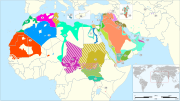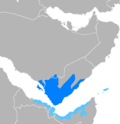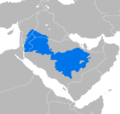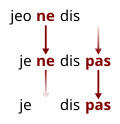Negation in Arabic (Arabic: ٱلنَّفْي, romanized: al-nafy 'the negative') is the array of approaches used in Arabic grammar to express grammatical negation...
11 KB (670 words) - 10:36, 5 November 2024
literally: At him (is) a house. → He has a house. For the negation of Arabic verbs, see Negation in Arabic. There are two types of prepositions, based on whether...
80 KB (6,808 words) - 19:51, 21 October 2024
also be seen in the prayer La hawla wa la quwwata illa billah, There is neither change nor power except by means of God. Negation in Arabic Dictionary [dead...
2 KB (135 words) - 23:03, 6 November 2024
Modern Standard Arabic). See varieties of Arabic for more information on grammar differences in the spoken varieties. The negation of Arabic verbs varies...
179 KB (7,338 words) - 02:06, 14 November 2024
Arabic: /ma-bi-t-ɡib-u-ha-lnaː-ʃ/ [negation]-[indicative]-[2nd.person.subject]-bring-[feminine.object]-to.us-[negation] "You (plural) aren't bringing her...
99 KB (10,202 words) - 22:19, 24 November 2024
Double negative (redirect from Multiple negation)
negative is a construction occurring when two forms of grammatical negation are used in the same sentence. This is typically used to convey a different shade...
45 KB (5,804 words) - 12:14, 8 November 2024
Peninsular Arabic dialects. However the dialect contains a number of unique particles used for coordination, negation and other sentence types. Examples in coordination...
14 KB (1,583 words) - 18:47, 9 November 2024
This article contains Levantine written in Arabic characters. Without proper rendering support, you may see احنا and احنا appearing as two different...
169 KB (14,369 words) - 13:50, 20 November 2024
This article contains Levantine written in Arabic characters. Without proper rendering support, you may see احنا and احنا appearing as two different...
12 KB (1,133 words) - 08:41, 28 October 2024
Emirati Arabic (Arabic: اللهجة الإماراتية, romanized: al-Lahjah al-Imārātīyah) refers to a group of Arabic dialectal varieties spoken by the Emiratis native...
15 KB (1,040 words) - 17:24, 23 October 2024
Algerian Arabic (Arabic: الدارجة الجزائرية, romanized: ad-Dārja al-Jazairia), natively known as Dziria, Darja or Derja, is a variety of Arabic spoken in Algeria...
33 KB (2,276 words) - 02:02, 22 October 2024
This article contains Levantine written in Arabic characters. Without proper rendering support, you may see احنا and احنا appearing as two different...
43 KB (5,073 words) - 10:03, 4 November 2024
are used in Najdi Arabic are: illi, in, itha. Two particles are used in negation, which are: ma and la. These particles come before the verb in verbal sentences...
19 KB (2,163 words) - 02:09, 18 November 2024
widely spoken vernacular Arabic variety in Egypt. It is part of the Afro-Asiatic language family, and originated in the Nile Delta in Lower Egypt. The estimated...
141 KB (10,555 words) - 15:41, 23 November 2024
Moroccan Arabic (Arabic: العربية المغربية الدارجة, romanized: al-ʻArabiyyah al-Maghribiyyah ad-Dārija lit. 'Moroccan vernacular Arabic'), also known as...
96 KB (8,071 words) - 15:42, 11 November 2024
Tunisian Arabic, or simply Tunisian (Arabic: تونسي, romanized: Tūnsi), is a variety of Arabic spoken in Tunisia. It is known among its 12 million speakers...
156 KB (16,450 words) - 23:29, 16 November 2024
Qatari Arabic exhibits structures that align with other Gulf dialects but with unique adaptations, such as specific verb forms and negation patterns...
8 KB (890 words) - 23:24, 7 November 2024
"they babbled" (IIQ). Hejazi Arabic does not employ double negation, nor does it append the negation particles -sh to negate verbs: Hejazi ما أَعْرِف /maː...
95 KB (7,717 words) - 16:08, 18 November 2024
Arabic dialects. However, the dialect contains a number of unique particles used for co-ordination, negation, and other sentence types. Examples in coordination...
12 KB (911 words) - 13:26, 13 November 2024
Lamedh (category Articles containing Arabic-language text)
association (لام الاختصاص) Lām of purpose (لام التعليل) Lām of absolute negation (لام الجحود) Imperative lām (لام الأمر) Lām of affirmative emphasis (لام...
7 KB (457 words) - 21:03, 18 October 2024
features of Central Semitic languages include the following: An innovative negation marker *bal, of uncertain origin. The generalization of t as the suffix...
3 KB (319 words) - 12:29, 1 May 2024
is a series of processes in historical linguistics, which describe the historical development of the expression of negation in a variety of languages,...
12 KB (1,459 words) - 01:32, 21 October 2024
Al- (Arabic: ٱلْـ, also romanized as el-, il-, and l- as pronounced in some varieties of Arabic), is the definite article in the Arabic language: a particle...
43 KB (5,679 words) - 23:41, 23 October 2024
Grammatical particle (category Articles containing Arabic-language text)
reasons. In Hindi, they may be used as honorifics, or to indicate emphasis or negation. In some languages, they are clearly defined; for example, in Chinese...
27 KB (2,084 words) - 21:21, 12 July 2024
dialects, Sanʽani Arabic also has several unique features. It uses the classical mā in the meaning of "what", as well as in negations. Unlike the classical...
8 KB (458 words) - 14:13, 23 October 2024
Genitive case (redirect from Genitive in English)
a negation of having [object] or a negation of an existence of [object], but the meaning of the two sentences and its structure is different. (In the...
36 KB (4,388 words) - 04:08, 25 November 2024
Berber languages (category Articles with text in Berber languages)
on 26 May 2024. Retrieved 8 February 2023. Mettouchi, Amina (2021). "Negation in Kabyle (Berber)". Journal of African Languages and Literatures (2): N...
115 KB (10,397 words) - 12:42, 25 November 2024
This article contains Levantine written in Arabic characters. Without proper rendering support, you may see احنا and احنا appearing as two different...
35 KB (2,584 words) - 14:18, 5 November 2024
Al-Zamakhshari (category Articles containing Arabic-language text)
negation, i.e., where negation extends beyond the present to negate any possible chances for a particular event or state to take place in the future (cf. He...
30 KB (4,088 words) - 13:21, 22 October 2024
verbs occur with negation, inversion, 'code', and emphatic affirmation while the [lexical] verbs do not.": 15, 21 Clausal negation most commonly employs...
95 KB (10,552 words) - 07:10, 2 October 2024






















